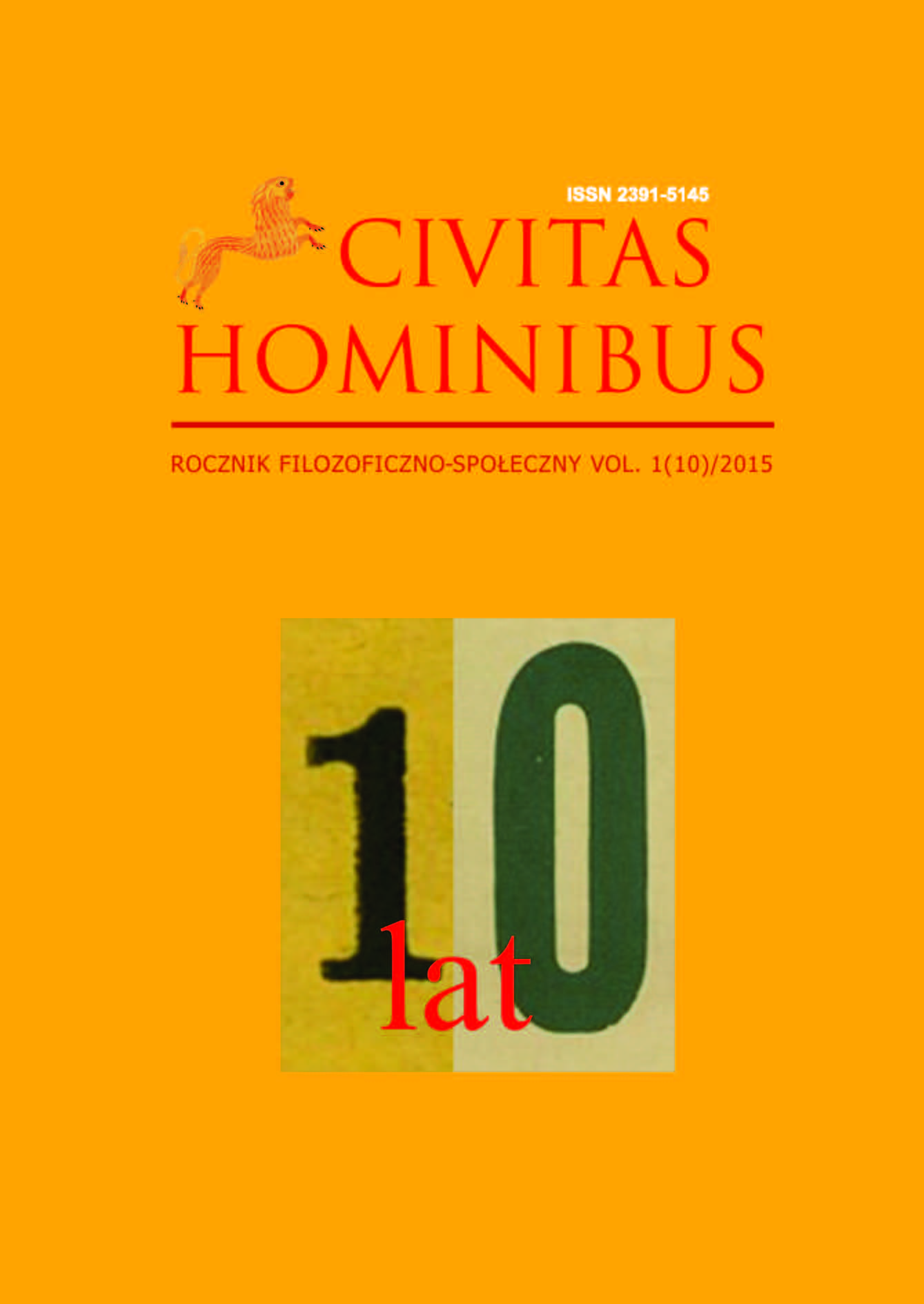The global socio-cultural aspect in the international space
DOI:
https://doi.org/10.25312/Keywords:
democracy, globalization, society, free market, capitalismAbstract
This article aims to advance the discussion on practical stimulation of global civil society. It also contains a historical analysis of the basis of its functioning in the international space. Globalization changes necessitate the assessment and implementation of most international processes not only from the perspective of the policies of nation states. Many of them are processes that disintegrate the international space, which once influenced its partial integration and the creation of national communities. The fight against global warming, terrorism, international crime, religious fundamentalism and, finally, the problem of mass economic emigration are issues for supranational and supra-state institutions, politically and economically independent of the influence of international corporations, as well as the political interests of countries that are shaping themselves to be superpowers. The nation state, given the current global conditions, should no longer be the only and uncritical political entity in the area of international relations. Although it competes with transnational monopolies and financial institutions on the global economic and financial scene, it still does not have a substantive and critical adversary for its foreign policy activities. A critical zone, as well as a real competitor of state organizations in relation to their foreign policy, may become the subjectification of the activities of global civil society in the area of international relations. Every action in the modern global space, both in the economic sphere and in the field of political reactions, must be subject to criticism and competition on the principles of democratic opposition and the free market. Unfortunately, the still visible uncriticism and absolutism of nation states in the sphere of international activity does not create conditions (or significantly delays them) for the real creation of an integrated world as a political and social whole. Due to this and the economic diversity of the world, among others, there are noticeable tendencies towards the disintegration of societies into individual groups of an economic, ideological or cultural nature. This is not conducive to world integration and the creation of a global society, despite the creation of certain real conditions for its dissemination as an independent political institution in the international arena. The current predominance of viewing world integration from a more national rather than cosmopolitan perspective does not create clear grounds for treating transnational and supra-state issues in the areas of global interests and threats. The opportunity for a noticeable advantage of the global integration option at the level of the individual interests of superpowers lies in the real creation and intensification of activities of an institution of a cosmopolitan nature, such as global civil society. By creating international public opinion, it systematically becomes a real opposition and a critic of the political actions of states in the area of international relations. Effective competitive and critical actions of world public opinion could mobilize most countries to change their political priorities from national to supranational, moving towards cosmopolitan world governance.
Downloads
References
Aronson E., Człowiek istota społeczna, PWN, Warszawa 2012.
Beck U., Modernizacja refleksyjna, Scholar, Warszawa 2009.
Beck U., Władza i przeciwwładza w epoce globalnej, Scholar, Warszawa 2005.
Borkowski P. J., Polityczne teorie integracji międzynarodowej, PAN, Warszawa 2007.
Castells M., Siła tożsamości, Scholar, PWN, Warszawa 2008.
Darin B., Społeczeństwo sieci, Scholar, Warszawa 2008.
De Montbrial T., Działanie i system świata, PWN, Warszawa 2011.
Diamond J., Strzelby, zarazki, maszyny, Prószyński i S-ka, Warszawa 2012.
Elliot A., Współczesna teoria społeczna, PAN, Warszawa 2011.
Fukuyama F., Historia ładu politycznego, Rebis, Poznań 2012.
Fukuyama F., Koniec historii, Znak, Kraków 2009.
Gender: perspektywa antropologiczna, (red.) R. E. Hryciuk, Wydawnictwo Uniwersytetu Warszawskiego, Warszawa 2007.
Giddens A., Konsekwencje nowoczesności, Znak, Kraków 2008.
Globalizacja polityki światowej, (red.) S. Smith, Wydawnictwo Uniwersytetu Jagiellońskiego, Kraków 2008.
Huntington S. P., Trzecia fala demokratyzacji, PWN, Warszawa 2009.
Huntington S. P., Zderzenie cywilizacji, Muza, Warszawa 2011.
Ideologie, państwa, społeczeństwa, (red.) R. Żelichowski, Seria Biblioteka Prac Doktorantów, nr 2, Wydawnictwo Uniwersytetu Warszawskiego, Warszawa 2011.
Malinowski M. J., Zróżnicowania i różnorodność polityczna, społeczna, kulturowa, religijna, ideologiczna, militarna, ekonomiczna i cywilizacyjna współczesnego świata. (Różne opcje i alternatywy. Refleksje osobiste), Rocznik Filozoficzno-Społeczny „Civitas Hominibus”, nr 1(8)/2013.
Mrożek-Dumanowska A., Zdanowski J., Islam a globalizacja, PWN, Warszawa 2005.
Nozick R., Anarchia, państwo i utopia, PWN, Warszawa 2010.
Państwo w teorii i praktyce stosunków międzynarodowych, (red.) M. Sułek, Warszawa 2009.
Pietrzak E., Ku globalnemu społeczeństwu obywatelskiemu, Elipsa, Warszawa 2014.
Pietrzak E., Warchał A., Zaorski-Sikora Ł., Podmiot, osoba, tożsamość, Wydawnictwo Wyższej Szkoły Humanistyczno-Ekonomicznej w Łodzi, Łódź 2007.
Poziom analizy stosunków międzynarodowych, (red.) E. Haliżak, Rambler, Lublin 2012.
Problem upadku państw w stosunkach międzynarodowych, (red.) R. Kłosowicz, Wydawnictwo Uniwersytetu Jagiellońskiego, Kraków 2012.
Regiony w stosunkach międzynarodowych, (red.) I. Topolewski, Wydawnictwo Uniwersytetu Marii Curie-Skłodowskiej, Lublin 2009.
Rocznik Filozoficzno-Społeczny „Civitas Hominibus”, (red.) E. Pietrzak, nr 1(7)/2012.
Rozkwitalska M., Wielokulturowość, ukierunkowanie na wartości i społeczna odpowiedzialność, Wyższa Szkoła Bankowa, Gdańsk 2013.
Sacrum i profanum, religia i polityka na świecie, (red.) P. Norris, Znak, Kraków 2006.
Status metodologiczny nauki o stosunkach międzynarodowych, (red.) M. Żbikowska, T. Klementewicz, „Studia Polityczne”, nr 3/1994.
„Studia Polityczne”, (red.) M. Żbikowska, nr 3, Instytut Studiów Politycznych, Warszawa 2014.
Waltz K. N., Struktura teorii stosunków międzynarodowych, Rambler, Warszawa 2010.
Walzer M., Moralne maksimum, moralne minimum, Wydawnictwo Krytyki Politycznej, Warszawa 2012.
Weber M., Racjonalność, władza, odczarowanie, Wydawnictwo Poznańskie, Poznań 2011.
Wendt A., Społeczna teoria stosunków międzynarodowych, Instytut Studiów Politycznych, Warszawa 2008.
Współczesne stosunki międzynarodowe, (red.) T. Łoś-Nowak, Wydawnictwo Uniwersytetu Wrocławskiego, Wrocław 2010.
Zachara M., Global governance, Wydawnictwo Uniwersytetu Jagiellońskiego, Kraków 2012.
Zrozumieć demokrację i obywatelskość, dziedzictwo grecko-rzymskie, (red.) J. Perzyńska, PWN, Warszawa 2007.
Downloads
Published
Issue
Section
License
Copyright (c) 2015 Akademia Humanistyczno-Ekonomiczna w Łodzi

This work is licensed under a Creative Commons Attribution-ShareAlike 4.0 International License.



